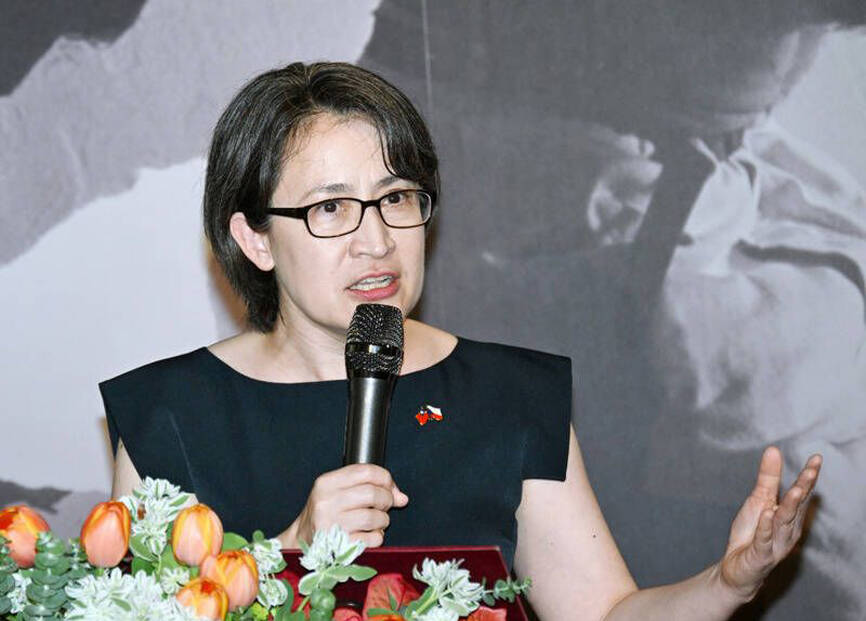China is likely to attempt more attacks on Taiwanese political leaders while they are traveling abroad, national security experts said, following reports that Chinese agents planned to harass then-vice president-elect Hsiao Bi-khim (蕭美琴) during her trip to the Czech Republic last year.
It is not clear whether Beijing orchestrated the plan against Hsiao or if it was created by Chinese diplomatic officials based in the Czech Republic, a National Security Bureau official said in an interview.
Czech officials last week told reporters that Chinese agents surveilled Hsiao during her visit to Prague in March last year and planned a collision with her vehicle.

Photo: Chung Li-hua, Taipei Times
Czech Military Intelligence learned that their Chinese counterparts attempted to create conditions to carry out a demonstrative incident involving Hsiao, which “did not go beyond the preparation stage,” agency director Petr Bartovsky told Czech Radio.
Regardless of whether orders came from Beijing or from the Chinese embassy, the revelations of planned unlawful activities and state violence against a Taiwanese political leader on foreign soil are highly damaging to China, said the bureau official, who asked to remain anonymous.
The Chinese Communist Party (CCP) has engaged in cross-border repression for years to intimidate its critics, such as Hong Kong singer Denise Ho (何韻詩), who had red paint thrown on her while in Taiwan to attend a rally advocating democracy in 2019, and political analyst Lee Cheng-hao (李正皓), who was attacked last month with pepper spray, the official said.
The CCP likely used its proxies to carry out those attacks, as it has done against democracy advocates in Hong Kong, the official said.
“China has used harassment and violent tactics to intimidate rights advocates in Hong Kong, but it is not clear what the intentions were in the plan targeting Hsiao,” he said.
However, the public reporting of the alleged plan has resulted in international condemnation of Chinese officials, he added.
Wang Zhin-sheng (王智盛), a professor in the Department of Border Police at Central Police University, said that the plan targeting Hsiao might have actually been a “stress test” on Prague.
If executed, the plan “would have put pressure on the Czech Republic to discourage it from inviting Taiwanese political leaders to visit,” Wang said.
“China’s hidden military intelligence agencies are not hesitant to test countries on the issue of Taiwan by conducting unlawful activities to gauge the tolerance of the host country,” he said.
“My assessment is that China planned it as a stress test, or a practice run,” Wang added.
“China is likely to try something like that again, perhaps targeting former president Tsai Ing-wen (蔡英文) on a foreign visit, or another important Taiwanese,” he said.
“The Czech Republic and the international community have condemned China in strong terms regarding the targeting of Hsiao, which is the right way to deal with it,” he said. “If there had been silence, China’s hidden military intelligence agents would have felt free to escalate their unlawful activities on foreign soil.”
The details of the plan targeting Hsiao — which went further than merely surveilling, but included ramming her vehicle — would have threatened her life, he said.
“That aspect had not been seen previously, but times are changing,” he added.
“China is expanding its reach to enforce its laws in other nations,” Wang said. “Taiwan and other democratic countries must unequivocally draw a line of ‘zero tolerance’ for Beijing’s illegal state violence conducted outside of China, otherwise Taiwan’s political leaders would face greater risks, including to their personal safety.”

Three Taiwanese airlines have prohibited passengers from packing Bluetooth earbuds and their charger cases in checked luggage. EVA Air and Uni Air said that Bluetooth earbuds and charger cases are categorized as portable electronic devices, which should be switched off if they are placed in checked luggage based on international aviation safety regulations. They must not be in standby or sleep mode. However, as charging would continue when earbuds are placed in the charger cases, which would contravene international aviation regulations, their cases must be carried as hand luggage, they said. Tigerair Taiwan said that earbud charger cases are equipped

Foreign travelers entering Taiwan on a short layover via Taiwan Taoyuan International Airport are receiving NT$600 gift vouchers from yesterday, the Tourism Administration said, adding that it hopes the incentive would boost tourism consumption at the airport. The program, which allows travelers holding non-Taiwan passports who enter the country during a layover of up to 24 hours to claim a voucher, aims to promote attractions at the airport, the agency said in a statement on Friday. To participate, travelers must sign up on the campaign Web site, the agency said. They can then present their passport and boarding pass for their connecting international

Temperatures in northern Taiwan are forecast to reach as high as 30°C today, as an ongoing northeasterly seasonal wind system weakens, the Central Weather Administration (CWA) said. CWA forecaster Tseng Chao-cheng (曾昭誠) said yesterday that with the seasonal wind system weakening, warmer easterly winds would boost the temperature today. Daytime temperatures in northern Taiwan and Yilan County are expected to range from 28°C to 30°C today, up about 3°C from yesterday, Tseng said. According to the CWA, temperature highs in central and southern Taiwan could stay stable. However, the weather is expected to turn cooler starting tonight as the northeasterly wind system strengthens again

Taiwan sweltered through its hottest October on record, the Central Weather Administration (CWA) said yesterday, the latest in a string of global temperature records. The main island endured its highest average temperature since 1950, CWA forecaster Liu Pei-teng said. Temperatures the world over have soared in recent years as human-induced climate change contributes to ever more erratic weather patterns. Taiwan’s average temperature was 27.381°C as of Thursday, Liu said. Liu said the average could slip 0.1°C by the end of yesterday, but it would still be higher than the previous record of 27.009°C in 2016. "The temperature only started lowering around Oct. 18 or 19